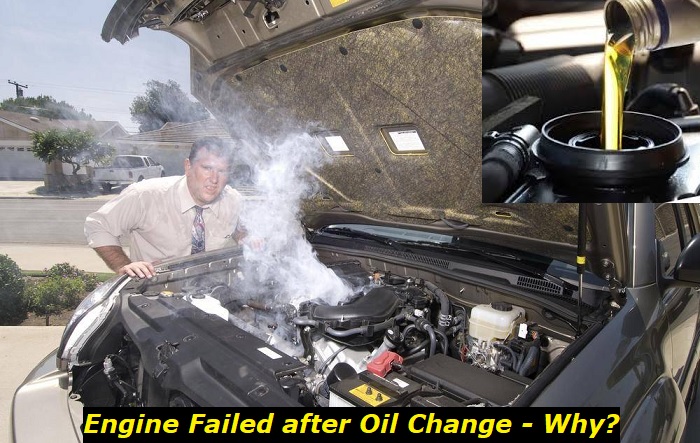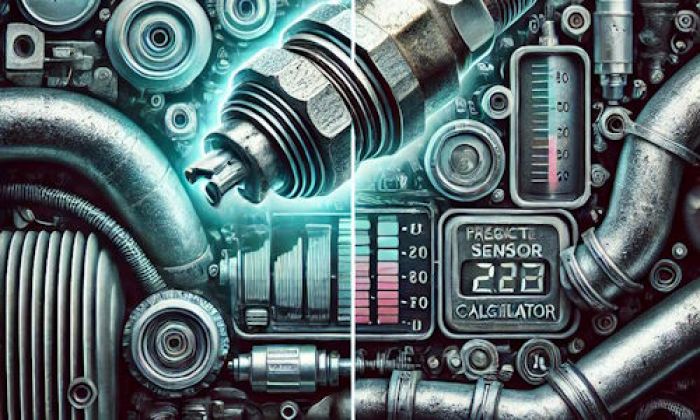Normally, your engine may blow after an oil change because the mechanic did something wrong like forgetting to put the oil plug back or forgetting to fill the engine with fresh oil. You may be surprised but this is not that rare and this happens all the time, even in the best service stations with high reputations and high prices for labor.
Oil-related issues highlights
- Level of urgency:high
- Average mileage:not related to mileage
- Repair cost:$0 - $1,900
- DIY repair:possible, in some cases
- Commonreasons:wrong oil, heavy oil consumption, leaks, engine problems
- Ifignored:fatal engine damage
- How to solve:use proper oil, check level regularly, solve issues withleaks

The most important reasons why the engine may fail after an oil change
I know at least three cases I can remember from my own experience when my friends or acquaintances had this thing happening with their cars. They literally had problems within the next 10 hours after changing engine oil. So, this is much more common than you may think and it has several important reasons.
Let's see what they are!
1. No oil plug installed
To drain the old oil, the majority of shops will unscrew the oil plug. This is the bolt in the bottom of your engine that allows the old oil to drain easily. At least 80% of old oil is drained which is an optimal amount for the change.
The problem is that sometimes, your mechanic may just forget to put that oil plug back before they fill the engine with fresh oil. The oil will be drained before you take the car from the shop and the engine will be as dry as hell. Of course, it will fail after you drive just several miles.
2. No oil filter
Another place that can throw away all the oil from your engine is the oil filter. This is another thing that is unscrewed and then installed when changing oil. The oil is pumped to the filter under pressure to be cleaned, so this pressure will eventually throw all the oil through the filter hole when you drive.
In this case, the consequences badly depend on the location of the filter. If it's located under the engine like in some Mitsubishi cars, you will not see anything, the oil will be thrown right onto the road. If the location of the filter is in the upper part of the engine, the entire engine bay will be covered in fresh oil.
3. No oil in your engine
As you may guess, another thing mechanics can forget to do is to actually fill the engine with fresh oil. However wild it may sound, it's actually pretty serious. If there is no oil and the engine is dry, it will work just several minutes or miles till it fatally drops and you will have to most likely replace the entire engine.
It's worth spending some time and checking that the mechanic did the job properly and your engine has the proper amount of oil in it before you take the car from the repair shop.
4. Engine flushing was done incorrectly
One more common reason why your engine may fail way before it's time for it to fail is that it was flushed. Flushing engine is only needed in some cases and I will tell you more about this at the end of the article.
When this procedure is completed, the engine works with thin oil in it. It's not really uncommon for this oil to create issues like air pockets and eventually stay in the engine in large amounts. Also, these air pockets may eventually block certain parts of your engine from lubricating with the proper oil.
5. The oil used in your engine is of bad quality
The oil itself may be pretty bad or the viscosity and other parameters may not match with your car. These issues are more than common, especially if you want to buy cheap products for car repair or maintenance. Also, if you ask your mechanic to choose oil and filter for your car, you are at risk of getting cheap products and paying for expensive ones.
You should control what exactly is used for servicing and maintaining your car. Without this, you may eventually find your engine blown. Bad oil will not kill the engine immediately, but it can fail after several days of driving.
What to do right after you notice problems?
When your engine is blown, it's usually blocked, so you can't drive the car anymore. Even if it's not blocked yet but you already feel that something is wrong after an oil change, stop the car immediately. Turn off the engine and don't start it till you figure out what the problem is.
Here's what you should do if the engine is still not blown:
- check the oil level;
- look at the filter - are there any leaks?
- look down the engine - do you see oil leaking?
- check if the engine block doesn't have any holes in it.
Any oil leaks may mean that something is wrong and the engine needs some help. Driving such a car is not recommended even if the engine still is able to start and move the vehicle. Any bad sounds or serious issues with performance may be just the first signs of fatal failure. If you don't drive such a car, there is a chance you can avoid engine replacement or expensive repairs.
If the engine is stuck and you see irreparable damage such as the holes in the engine block or oil leaking from cracks in it, things are as bad as they can be. This engine is most likely fatally failed and will need to be replaced with another one. Repairing it, after such incidents, doesn't seem like a good idea in terms of the price.
If you happen to have this, just call a tow truck and take your vehicle to the repair shop.
But before this make sure you call the shop that changed the oil, tell them you are going to report this to police. Also, call your insurance company if the insurance covers such cases. Take as many pictures and videos of the visible problem as you can. You may also contact a lawyer to get legal help in this case.
How can you prevent an engine from failing after an oil change?
It's important to check how exactly the work was done in the vehicle before you take the car from the dealership or repair shop. When it's just the oil change, there is nothing much you can do. But several things are still possible.
Here they are:
- check the oil level using the dipstick - at least, you will make sure that the oil is there;
- look down the engine and try to locate any leaks;
- make sure the oil filter is in its place, also make sure it's the new oil filter;
- start the engine, open the hood, and make sure it works as it should, without any bad noises and vibrations.
After you do all of these, you will be quite sure that the engine is OK and you may drive. The majority of the problems will be solved before they may affect your engine.
If you think that dealers are good at changing the oil or making any other repairs to your car, you are wrong. It all depends on the person who is doing the job and people tend to forget things, so never rely on dealers or trusted shops. Just check everything by yourself and make sure you are not going to look at the blown engine in a couple of hours.
Engine flushing - good or bad?
I know several people who flush their engines with transmission fluid or special flushing oils every time they change oil. Some other friends of mine religiously flush their engines once every 3 or 5 years. They never listen to me telling me that their experience tells them this is the only correct way to deal with your car.
Well, 20 years ago it may have been a good way to clean the engine from bad oil that contaminated the engine badly during 10K miles. Or it is a good way to prepare the engine that hasn't been maintained for years. Or it's good when the engine oil is completely contaminated, and has a lot of metal shaves in it. Otherwise, flushing your engine is just unnecessary and may lead to different kinds of consequences that you don't want to encounter.
Unfortunately, flushing engine oil is very often the way to attract problems like engine failure. Only use this method when it's completely necessary.
Final thoughts
It's not the experience you want to get - the blown engine is always very expensive and unpleasant. You may not only have to pay for engine replacement but also need to wait for a month or so till all the parts are there for the proper repair.
So, the best strategy is to check whether the oil change was completed properly. Follow the tips given above to forget about issues with the engine oil changes. Unfortunately, these problems are much more common than you may think and it's all about your attention to try and prevent them from happening rather than pay thousands of dollars for repairs.
About the authors
The CarAraC research team is composed of seasoned auto mechanics and automotive industry professionals, including individuals with advanced degrees and certifications in their field. Our team members boast prestigious credentials, reflecting their extensive knowledge and skills. These qualifications include: IMI: Institute of the Motor Industry, ASE-Certified Master Automobile Technicians; Coventry University, Graduate of MA in Automotive Journalism; Politecnico di Torino, Italy, MS Automotive Engineering; Ss. Cyril and Methodius University in Skopje, Mechanical University in Skopje; TOC Automotive College; DHA Suffa University, Department of Mechanical Engineering






Add comment